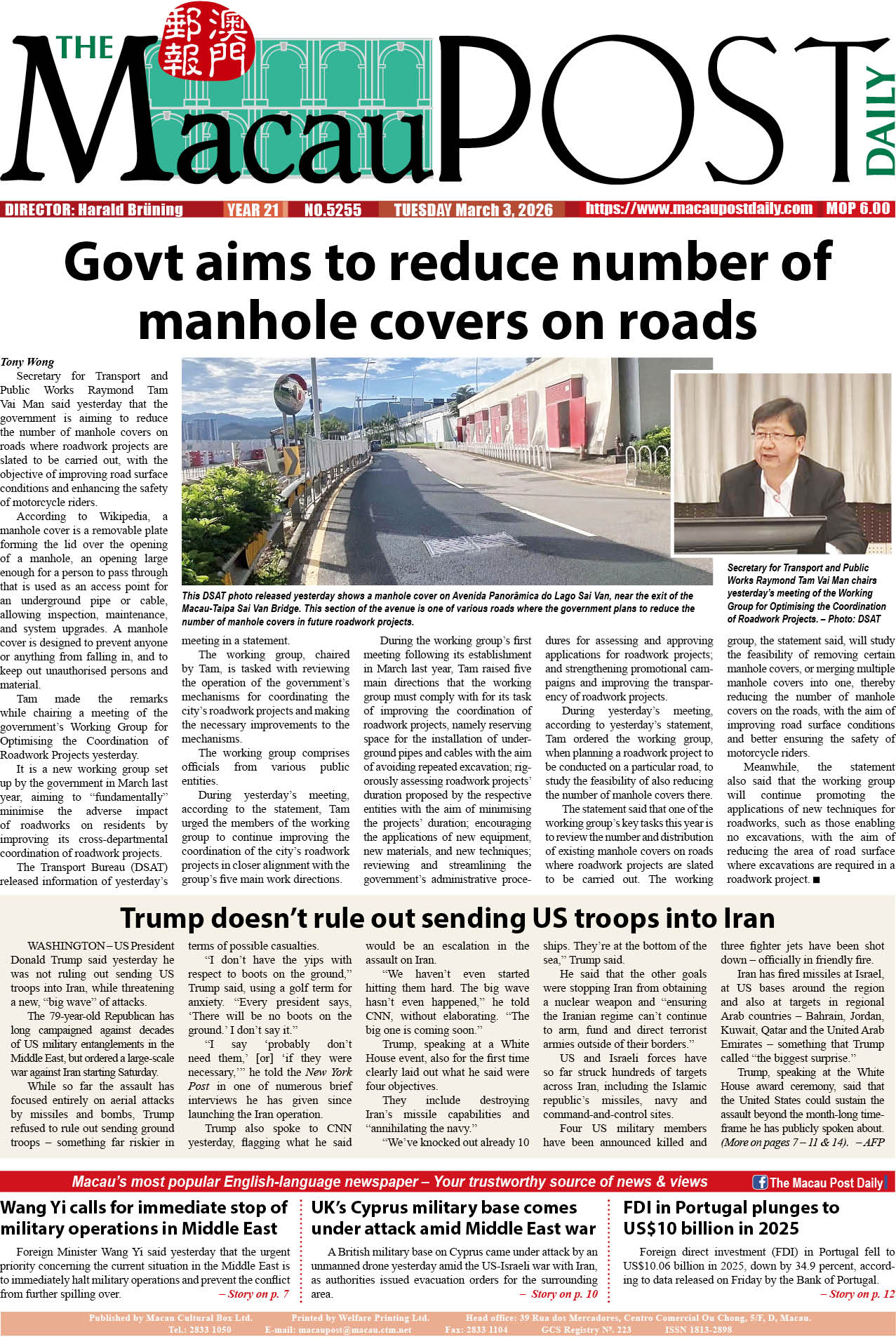In an exclusive interview with The Macau Post Daily, Leung Hio Ming, associate professor at the Macau Polytechnic University (MPU), shared his experience of cultural education and prospects – and the excitement of playing his favourite composer’s sonatas this Friday at the Macau Cultural Centre (CCM) in Nape.
The interview was conducted in Leung’s office on the MPU campus in Zape last week.
After obtaining his doctorate in musical arts from the University of Kansas and working as a teaching assistant for a few years, Leung returned to Macau in 1995 and continued his education career in the Conservatório de Macau, and two years later took on a second job at the former Macau Polytechnic Institute (IPM), where he was tasked with setting up the pedagogy systems and teaching various music subjects at both the Conservatorium and IPM (now UPM).
Previously, Leung held a number of key governmental positions, such as president of the Cultural Affairs Bureau (IC). After stepping down from the public administration, he restarted his teaching and performing career.
At Friday’s recital Leung will be playing the two sonatas of Beethoven’s Op. 27, both entitled “Sonata quasi Una Fantasia”, the second one “nicknamed “Moonlight””. After the intermission, Leung will continue his performance with two of the most famous middle-period pieces of Beethoven: “Appassionata” and “Waldstein”.
Beethoven’s importance
According to Leung, the importance of Beethoven’s middle-period pieces cannot be overstressed. Leung said that both have a profound impact on Europea’s romantic-period composers such as Chopin and Liszt. “These sonatas were conceived and planned as symphonies: the structure is very layered and complex. If one is to transform these sonatas into orchestrations, the result will be equally wonderful,” Leung said.
Leung said that Beethoven’s music is at the focal point of the transition from the classical to the romantic period. “He was still confined by the aesthetics of the classical period, but the musicality was evolving. There are so many more emotional depths resembling the romantic period: wrath, tranquillity, dramatics. Every piece also started to have a theme, such as the “Symphony of Fate” and “Pastoral Symphony”.
“I was enchanted by how Beethoven expressed his passion within the structure of the classical period,” Leung said, adding that he found himself in Beethoven’s hot-tempered personality and music, and felt comfort interpreting Beethoven’s fantastic energy and dynamics.
Back to musicianship
Since Leung’s departure from the public administration, he has been dedicating his life to music education and picking up his music life. “I am glad that I still have the chance to perform music. Playing the piano does not spare a fragile body: it requires great endurance and spirit from the musician. I can see a limited timeframe for me, I want to do more now.
“Nonetheless, with age comes experience and knowledge. Now, I understand the music more profoundly, which greatly helps my interpretation of Beethoven,” Leung said.
For Leung, being a pianist equals sacrificing a great deal in other parts of life. “Hours upon hours are poured into being a pianist. Some musicians are incredibly successful, but we forget those who never were. This is a huge stress for anyone on this path. I am fortunate enough to share my music on stage, especially to my students.
On education and culture
Reiterating the hardships of mastering music, Leung, the veteran pianist, stressed that parents and students should think twice before they choose a music career. “Learning music is extremely beneficial to a person’s overall development, and I encourage everyone to give it a try when they’re young. Meanwhile, studying music as a prospective career is another matter, students and parents often overlook the talent and dedication required in the field,” Leung noted.
Having worked in public administration and education institutions for decades, Leung said that he has observed the advance of the music culture in Macau. “Barely anyone knew music in the 90s. Nowadays, it is ubiquitous, and I believe it is a great success overall. I am not just referring to the music events and how prevalent music is, but also that music education has been integrated into the economic system,” he said
Not everyone can become a successful professional musician, but Leung said he was glad that nowadays graduate students can choose many career paths: arts management, music education, not just performing musicians. “Talented students and the less talented ones can find their place easier in society compared to the past, and it gives a boost to tertiary music education, as well as the overall music atmosphere in Macau,” Leung said.
Leung’s recital will be held on Friday night at the Small Auditorium of the Macau Cultural Centre.
Tickets can be bought at macauticket.com for 250 to 280 patacas.



Professor Leung Hio Ming performs in a recital at the Macau Cultural Centre (CCM) in July 2021. – Photos provided by Leung.










